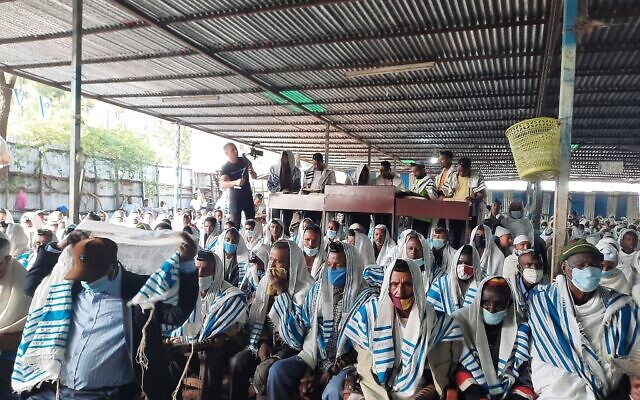Three Ethiopian citizens who were waiting in the city of Gondar to be reunited with family members in Israel were killed in shootings connected to a conflict within the armed forces, a coordinator from their community said Thursday.
The fatalities occurred earlier this month in Gondar, where regional special forces in Ethiopia’s Amhara region rioted in protest of the government’s decision to disband them, according to a person in Gondar helping prospective immigrants to Israel, who asked not to be named for security reasons.
“The special forces troops fired sort of anywhere, not aiming at people deliberately, but the bullets ended up hitting people going about their business in Gondar, and some were unfortunately hit,” the source told The Times of Israel. The source also said six other prospective immigrants to Israel, including at least one boy, were wounded but have since recovered.
The three fatalities were not targeted because of antisemitism, the source added.
The fatalities were members of a community known as Falash Mura, a term some say is derogatory, whose ancestors were Jews forcibly converted to Christianity in the 19th century. Their efforts to immigrate to Israel are more complicated and treated differently than those of Ethiopian Jews whose ancestors were not forcibly converted, known as Beta Israel.
Successive Israeli governments have allowed in at least 25,000 non-Beta Israel Ethiopians – a quarter of the total number of Ethiopians living in Israel — since 1992, when some Beta Israel Ethiopian Jews began lobbying for the admittance of their non-Beta Israel relatives.
Non-Beta Israel Ethiopians are allowed to become Israeli only if they have relatives already in the country, under a government decree separate from the Law of Return for Jews and their relatives.
Their naturalization is on the condition they undergo an Orthodox conversion to Judaism. But community leaders and people familiar with their community say they are Jews, many of whom worship regularly at synagogues and community centers set up for them by the Struggle to Save Ethiopian Jewry.
Some prospective immigrants have been waiting for years for answers on their applications to immigrate, and additional years for definitive authorization and flight tickets, which is unaffordable to many people in Ethiopia, where the average monthly salary is about $130. Many of the approved have first-degree relatives who are not eligible to immigrate.
Ethiopian Jews are divided on the issues of descendants of the forcibly converted. Some, including religious leaders, recognize the descendants as Jews. Rabbinic authorities in the past, including the late chief rabbi Ovadia Yosef, have ruled that the descendants’ population was indeed Jewish. But other Ethiopian Jews today dispute that this still applies to the Ethiopians waiting to immigrate today.
In 2020, the government and the Jewish Agency launched an effort to bring to Israel a wave of 3,000 newcomers from the descendants’ community under an operation codenamed Zur Israel. The operation, delayed by COVID-19 and the outbreak of multiple conflicts in Ethiopia, is ongoing.



